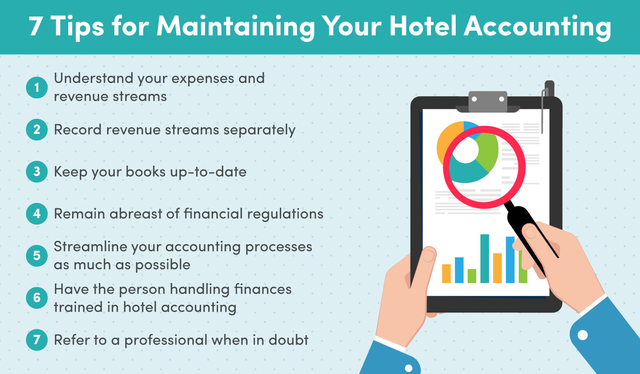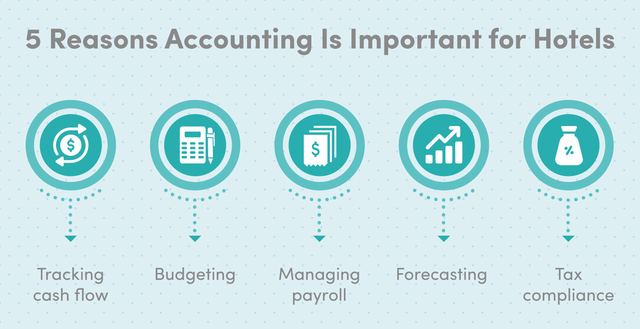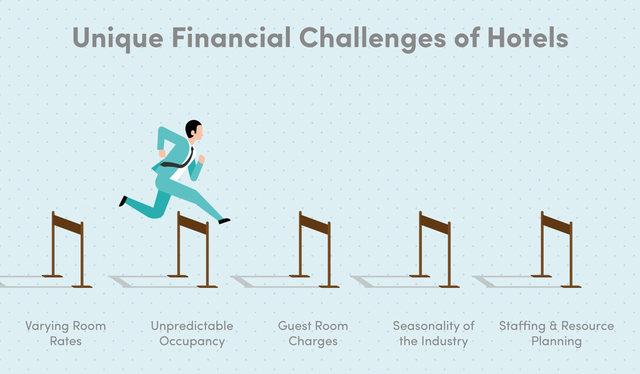Hotel Accounting Services


August 12th, 2020
Written by:
Jacob Dayan
The hospitality industry is notoriously complex and takes careful management in order to succeed. Running a hotel business is no easy task, especially when you don’t have a financial background. From managing guest expectations to accurately budgeting for both the on- and off-season, there is a lot to keep track of.
If you are struggling with the financial management of your hotel business, you’re not alone. In fact, many hotels are faced with the unique challenges of seasonality, accounting for multiple (and unstandardized) revenue streams and expenses, and keeping up with the daily bookkeeping responsibilities.
Fortunately, there are resources available to help you succeed, such as our overview of hotel accounting. We’ll cover pitfalls to avoid, tips for bookkeeping and accounting, and if you don’t want to do it alone, how you can utilize our hotel accounting services to your advantage. Need quick answers? Use the links below to guide you to the right section.
Streamline your hotel accounting with FinancePal today.
Learn More
Importance of Accounting for the Hotel Industry
You can’t run any type of business without a good understanding of your finances, and that includes the hospitality industry. So much effort goes into creating the perfect image and guest experience, but what fuels those essential aspects of hotel management and success, is a good financial foundation. That foundation starts with up-to-date and accurate accounting processes.
To understand how vital accounting is for your hotel business, it’s important to look at the bigger picture of how proper accounting and financial management impacts your organization:
-
- Keeping track of cash flow: Having a clear view of your hotel’s cash flow is important because that’s how you know how much money you have to spend. Cash flow shows how much money is coming in and going out of your business, which is useful information to have so that you don’t overspend.
- Budgeting: A monthly budget is critical for any business, but you can’t do that if you don’t have detailed records of your expenditures as well as all sources of income.
- Forecasting: Consistent financial records are necessary in order for you to be able to create realistic forecasts that you can use to plan future projects and expenditures. This is particularly important if you’re looking to expand your hotel to new locations in the near future.
- Managing payroll: The employees of a hotel are inarguably essential to the functioning of any hotel and maintaining guest expectations. And one of the most important aspects of keeping your employees happy is paying them in full and on time. If your accounting isn’t being maintained, this can become a problem quickly.
- Tax compliance: The IRS is nothing to mess around with, and this is especially true when it comes to financial reporting and paying your small business taxes. However, when your hotel accounting is not done correctly, you might find yourself in violation of both requirements. How so? When your bookkeeping and accounting are off, your financial records become inaccurate, which then affects how your taxes are reported. If an audit is conducted and the mistake is caught, you could be facing serious penalties.
As you can see, accounting is an important aspect of your ability to make smart financial decisions as a hotel manager. While you might have every intention of getting a handle on your hotel’s accounting, there are a lot of obstacles that may discourage you or limit how well your best intentions are executed.
Accounting Challenges Faced by Hotel Businesses
Based on how hotels are run and all the moving parts involved, there are certain factors that can make hospitality accounting difficult, if not impossible, for the untrained individual.
Let’s take a closer look at some of these unique challenges:
-
- Large number of revenue streams: While having a multitude of revenue streams (on-site restaurant, bar, conference room rentals, room service, etc.) isn’t necessarily a bad thing, it can make your hotel’s accounting much more complex than the average business with a limited (and predictable) product line.
- Sustaining unprofitable services: There are a variety of services that hotels are simply expected to offer that don’t bring in any revenue. This would include any complimentary services like providing dry cleaning, continental breakfast, etc. While these services might have a minimal cost on a per-guest basis, they can add up. Failing to account for these easily overlooked costs could erode your profits and have a serious impact on your bottom line. It’s important to make sure these costs are accounted for and baked into room rates to help prevent major losses.
- Occupancy: Occupancy rates can be difficult to predict for hotels because it can depend on the season, economy, marketing campaigns, and more. And what’s worse is occupancy can have a major impact on revenue, so it’s important to be able to predict occupancy with somewhat accuracy.
- Varying room rates: Unlike a specific product or service, room rates don’t have a set price necessarily. Instead, room rates can vary based on the type of room, the view, whether it’s a weekday or weekend, and the season.
- Room charges: Another source of income that can be difficult to record and use as a factor in predictions is room charges. This is because there’s no standard—some guests may choose to use the service, or not. Additionally, some high profile guests may put hundreds or even thousands of dollars on their room tab, while others make smaller purchases like breakfast in bed or a single bottle of champagne.
- Note that if you offer room service inclusive packages at your hotel or resort, you’ll need to make sure you have a way to account for these additional expenses (building them into the cost of guests’ stay).
- Seasonality: As mentioned, seasonality can have a major impact on revenue. Depending on where you’re located, the seasonal influence on your hotel may differ. However, for many locales, there is a clear tourist season (or convention season), that defines the on- versus off-seasons.
- Staffing: In the hospitality industry, whether it be restaurants, hotels, or other businesses, staffing is a consistent challenge. Overstaff and you’re wasting money; under-staff, and you risk lower-quality customer service and upset guests.
- Resource planning: In addition to staffing, planning how to allocate other resources such as staff (how many cleaning attendants you need, which restaurants/bars need the most servers, etc.), food preparation, event planning, and so on.
When using these factors as part of your budget and planning for future endeavors, it’s important to use averages. While this won’t give you a hard number that is going to be consistent, it provides the closest thing to accuracy that you’re going to be able to get.
While these challenges are well-known in the industry, they are rarely adequately checked and regulated within hospitality accounting, leading to much bigger issues down the line. That said, don’t be discouraged. Knowing about these common pitfalls is the first step in the right direction.
How to Maintain Hotel Accounts
Now that you’re aware of these challenges and how they can impact your bottom line, it’s time to learn how you can counteract these issues and make sure your finances are in order. For starters, there are several key tips for maintaining hotel accounts:
-
- Take the time to get a firm understanding of your expenses and revenue streams. There are a variety of fixed expenses (vendor contracts, software subscriptions, building taxes, etc.) and variable expenses (payroll, toiletries, cleaning supplies, commissions, etc.). Understanding what they are and how they’re classified is essential for correct bookkeeping. The same goes for revenue.
- Record revenue streams separately so they can be correctly accounted for. Each revenue stream needs to be recorded in their own ledger. This allows you to closely track and analyze the profitability of each revenue stream.
- Keep your books up-to-date. Saving all of your bookkeeping and accounting tasks for the end of the month can lead to a rushed job, unnecessary stress, miscalculations, and incorrect accounting overall. Instead, do it on a daily basis if you can. Many managers find that doing so as part of their nightly duties makes their job much less stressful.
- Remain abreast of financial regulations that apply to the hospitality industry. Every industry has specific financial regulations that they must abide by in order to remain in compliance.
- Streamline your accounting processes as much as possible. The more organized your bookkeeping and accounting processes are, the less time it will take and the less room for error.
- Make sure whoever is handling the finances is trained in hotel accounting. Whether it’s you, another administrative staff member, or even an on-site accountant, make sure they are trained in the nuances of hotel and hospitality accounting. With so many unique factors to consider, doing so could be the difference between reliable financial records and having a huge mess on your hands.
- When in doubt, refer to a professional. As with all aspects of business management, when you encounter an obstacle to success or have technical questions, you don’t want to move forward blindly. Instead, you should refer to a professional, whether that be a financial advisor, resources from an authority in the industry, or your mentor.

If you’re just getting familiar with accounting in general, there are some additional blog posts you should check out to get a foundational understanding of the concepts you’ll be dealing with when managing your finances:
If this all seems overwhelming, you should know that you’re not left to your own devices. While software can be helpful, it still requires an understanding of hotel accounting and leaves you completely reliant on technology. However, there is another way—outsourcing with professional hotel accounting services.
Why Outsource Accounting for Your Hotel?
Running a hotel involves a lot of moving parts, with financial management being the foundation for operations. With all of these responsibilities demanding your attention, it can be difficult to maintain your accounting, which falls through the cracks for too many hotel owners.
It’s important to note that making the wrong assumptions about your hotel business’s finances can result in extremely flawed planning and, in the worst-case scenario, potentially run your hotel into the ground.
To keep your bookkeeping and accounting on track, it’s typically recommended to outsource the accounting for your hotel business if you can. If you’re wondering whether the additional expense is really worth it, here’s a short list of some of the most notable benefits:
-
- Ability to focus on business growth: One of the biggest advantages of outsourcing your accounting is getting time back to focus on managing the many other aspects of the hotel and preparing for expansion. Growing a business, especially in the hospitality industry, takes a lot of time and effort—some would say even your undivided attention.
- Less stress and frustration trying to learn accounting: For someone without a financial background, learning accounting principles can be challenging, especially when the stakes of your hotel business’s financial success are so high. When this burden is removed from your shoulders, you can take a breath of relief.
- Accurate financial records: When your financial records for a period are inaccurate, this sets you up at a disadvantage that can negatively impact your decisions now, and have lasting repercussions on your bottom line. By having professionally prepared accounting and financial records, you’ll find that they provide useful insights and a better basis for forecasting.
- Correct financial statements: Having accurate financial records is important for a variety of reasons. Above and beyond helping with budgeting and forecasting, having complete and correct financial records is essential when trying to secure funding, as banks and investors will want to review them first.
- Save money: By eliminating unnecessary in-house positions or using your valuable time more wisely, you can save money. Instead of paying an in-house accountant, which can be expensive when you include salary, benefits, etc., you can invest those savings into vital operations and growing the business.
- Professional financial advice: With an external accounting team that specializes in hospitality accounting, you’ll gain access to a whole new level of expertise. With an expert accountant for hotels reviewing your expenses, revenue, etc., you can get valuable insights and recommendations that can help you move your business in a better direction financially.
- Proper depreciation of assets: Asset depreciation is an important aspect of proper accounting for businesses that own machinery and other equipment that loses value over time. Since these items are usually a large financial investment, it’s important to have a good idea of when they’ll need to be replaced and how much you can recover if you were to sell them at that time.
As you can see, accounting services can be a cost-effective and efficient way to remove the burden of handling accounting internally.

Advantages of FinancePal’s Hotel Accounting Services
If you’re considering outsourcing your hotel accounting, you want to find a provider that offers the most value. When you sign up for FinancePal’s hotel accounting services, you can benefit from:
-
- A dedicated team who knows your business inside and out
- Access to our high-tech, yet easy-to-use platform
- Centralized financial information that allows you to gather key takeaways
- Weekly and monthly financial statements
- Accounting services tailored to the industry and needs of your hotel
- Affordable pricing options
- Assistance from our U.S.-based accountants for hotels whenever you need it
- Financial advice customized to your business
In addition to accounting for small businesses, you can take advantage of our team of financial experts, including tax professionals, when you choose comprehensive financial management with FinancePal.
Simplify your Hotel accounting today.
Learn more
Hotel Accounting & Tax Compliance
In addition to budgeting, forecasting, and overall good financial management of your hotel, accounting is also related to tax compliance (as mentioned earlier). Having an accountant for hotels on your side can help you avoid the whole trickle-down effect of incorrect financial statements and, as a result, incorrect tax filing. But there’s more to doing your taxes than just taking information from your financial statements and filling in the prompts on your tax forms. That’s where having a tax professional’s help comes in.
With FinancePal, you can elect to include tax preparation in your services. Our tax experts are well-versed in filing taxes for hospitality-based businesses like yours. With our tax prep services, you can expect the following:
-
- Maximum tax savings
- Proper tax filing and payment
- Stress-free tax season
- Good standing with the IRS
No more worrying about missing tax deadlines, filling out the forms wrong, or calculating your estimated payment incorrectly—our experts will have it all covered.
If you consider the typical tax prep costs for small businesses, you’ll see it makes sense to bundle your services together—especially because your team can work together to ensure that all financial aspects of your hotel are running smoothly.
Master Your Hotel’s Accounting for a Better Financial Future
It can be easy to become overwhelmed by the financial responsibilities of running a hotel, but with these tips, you’ll be better equipped to manage your business. And if you decide it makes sense to outsource your hotel accounting services, FinancePal is here to help with industry-leading financial management services, U.S.-based financial and tax experts, and a cutting-edge platform that will make stressing over accounting for your hotel business a thing of the past. Get started today to take the next step toward a better financial future.
About the Author
Jacob Dayan, Esq.
Jacob Dayan is a true Chicagoan, born and raised in the Windy City. After starting his career as a financial analyst in New York City, Jacob returned to Chicago and co-founded FinancePal in 2015. He graduated Magna Cum Laude from Mitchell Hamline School of Law, and is a licensed attorney in Illinois.
Jacob has crafted articles covering a variety of tax and finance topics, including resolution strategy, financial planning, and more. He has been featured in an array of publications, including Accounting Web, Yahoo, and Business2Community.
Read More
About the Author
Nick Charveron, EA
Nick Charveron is a licensed tax practitioner, Co-Founder & Partner of Community Tax, LLC. His Enrolled Agent designation is the highest tax credential offered by the U.S Department of Treasury, providing unrestricted practice rights before the IRS.
Read More
About the Author
Jason Gabbard, Founder and CEO of JUSTLAW
Jason Gabbard is a lawyer and the founder of JUSTLAW.
About the Author
Andrew Jordan, Chief Operations Officer at FinancePal
Andrew is an experienced CPA and has extensive executive leadership experience.










